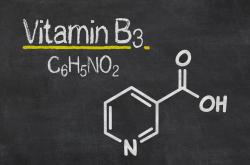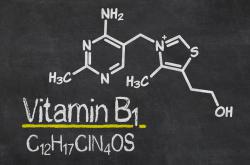Vitamin B7 Deficiency: Is a Lack of Biotin Exacerbating Your Fatigue?
Biotin - aka vitamin B7 - often represents special challenge to fatigue sufferers. Learn how to identify whether or not you have biotin deficiency and what to do about it.
If you’ve been struggling to get to the root cause of your fatigue, chances are that you are suffering from at least some sort of vitamin or mineral deficiency. Even if you have a medical condition like diabetes that is impacting your energy levels, vitamins are often an issue as well. One of those vitamins – biotin – can be especially troublesome at low levels, since it is so critical for the proper utilization of the food you eat.
What is Vitamin B7 and How Does it Benefit You?
Vitamin B7 is sometimes referred to as biotin. As a member of the B-complex family, this water-soluble vitamin works with those other B vitamins to calm the nervous system and support adrenal function. Its role in metabolizing fat and carbohydrates is important for maintaining consistent energy metabolism, since it is the substance that enables many enzymes to work as designed.
Without biotin, the body cannot properly use the energy that is derived from the food you consume. That inability to manage the metabolic process can result in depleted energy levels in a very short period of time, leading to severe fatigue. That fatigue can persist until the biotin levels are replenished and the body once again resumes normal metabolic function.
How Do You Know if You Suffer From Vitamin B7 Deficiency?
Though rare, when a deficiency occurs the signs are easily noted. They include fatigue, hair loss, dermatitis, skin dryness, muscle pain, and intestinal problems. Anemia can also result from prolonged low levels of this vitamin. Fortunately, the body needs very little biotin and has mechanisms for reusing biotin that it has already cycled through. Still, various medications and other factors can result in a deficiency, so it is important to know how to recognize it when it occurs.
In addition to those physical symptoms, patients can also experience various neurological issues as well. These can include things like a lack of motivation, numbness in the arms and legs, depression, and tingling. In more severe instances, hallucinations are even possible. If any of those symptoms accompany your fatigue, seek a doctor’s guidance as soon as possible.
Finally, keep in mind that the body’s need for biotin changes as time goes by. Older people tend to need more biotin, as their bodies naturally lose some of their ability to metabolize food into energy as they age. So, if you’re older, or are in the habit of consuming a lot of egg whites, recognize that those are risk factors that might make you more susceptible to this deficiency as well.
How to Diagnose Vitamin B7 Deficiency
Standardized laboratory tests are quite inefficient for diagnosing this deficiency. Instead, doctors rely on clinical diagnosis, paying careful attention to all of the signs and symptoms presented and reported by the patient. The main clinical signs that they look for involve loss of hair and a red rash with scales that appears around the mouth, eyes, and the nose. Of course, any reports of hallucinations or tingling in the extremities are also considered strong signals that a deficiency is at work.
In instances where clinical diagnosis is less clear, there are tests that can be conducted to assess biotin levels. Urine tests are used to measure ketones levels. Plasma tests can check the level of various amino acids. Finally, a serum panel may be conducted as well.
Food Sources for Vitamin B7
Most diets provide more than enough biotin, which is why the deficiency is so rare. The vitamin is present in foods like organ meats, cereals that are fortified with vitamins and minerals, soy bran, wheat bran, mushrooms, potatoes, cheese, milk, egg yolks, chicken, broccoli, fish, corn, bread, pork, nuts, and many others.
Egg lovers should rejoice, since cooked eggs are very rich in this essential nutrient. However, most of that concentration is located in the yolk, so eat the entire egg. Also, try to avoid processed foods, since processing strips this and other vitamins out of the food you eat.
How to Supplement Vitamin B7
The daily requirements are so low that adults only require about 30 micrograms – an amount that can be obtained simply by taking any B-complex multivitamin. Children require as little as 5 mcg for infants, and 25 mcg for adolescents.
Potential Side Effects and Interactions
There are no reported side effects related to the intake of biotin. However, users should be aware that biotin levels are vulnerable to oral antibiotics and anti-seizure medications. Accutane can prevent biotin from being processed, and an excess amount of Pantothenic acid (vitamin B5) can actually lower vitamin B7 levels.
You might also be interested in:
- Biotin (Vitamin H) Benefits and Signs of Deficiency. http://www.vitamin-mineral-info.com/biotin-vitamin-h-benefits-signs-of-deficiency.php
- Biotin. http://www.webmd.com/vitamins-supplements/ingredientmono-313-vitamin%20b7%20(biotin).aspx?activeingredientid=313&activeingredientname=vitamin%20b7%20(biotin)
- Everything you Need to Know About Biotin. http://www.naturalremedies.org/b7/
- Biotin Deficiency Workup. http://emedicine.medscape.com/article/984803-workup
- Vitamin B7 Facts: Everything You Need to Know. http://www.symptomfind.com/nutrition-supplements/vitamin-b7-guide/


















Leave a comment